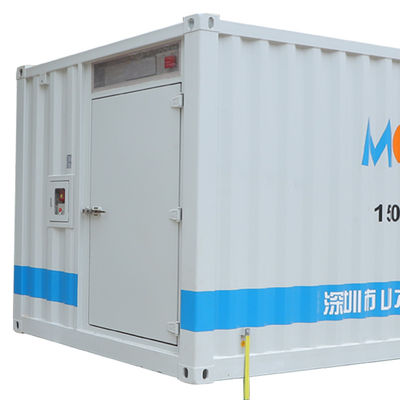|
Detail Information |
|||
Product Description
Commercial ESS CAN Communication Protocol 90% Charge/Discharge Efficiency
Product Description:
Features:
Industrial and commercial lithium battery energy storage systems are advantageous in many ways. With high energy density, these systems enable efficient storage of large volumes of energy in limited space. Furthermore, they are optimized for frequent charge and discharge cycles without compromising performance.
These systems are also sought-after for their impressive response time. In contrast to conventional energy storage systems, lithium batteries allow fast and steady satisfaction of fluctuating energy demands. An additional advantage lies in their scalability. Whenever additional power is needed, these systems can be expanded easily.
Last but not least, industrial and commercial lithium batteries energy storage systems prioritize safety. With sophisticated monitoring and control functionalities, their performance is tracked in real-time and necessary safety measures are enforced. As a result, businesses and industries benefit from reliable and efficient energy storage solutions that facilitate enhanced operational efficiency and sustainability.
Technical Parameters:
| Parameter | Value |
|---|---|
| Product Name | Commercial Energy Storage System (ESS) |
| Power Capacity | 100kW-2MW |
| Battery Type | Lithium-ion |
| Operating Temperature | -20℃~55℃ |
| Charge/Discharge Efficiency | 90% |
| Safety Protection | Overcharge/ Overdischarge/ Overcurrent/ Short Circuit/ Temperature/ Fire |
| Battery Capacity | 100kWh-2MWh |
| Warranty | 5 Years |
| Communication Protocol | Modbus/CAN/TCP/IP |
| Installation Space | Indoor/Outdoor |
| Cycle Life | 5000-10000 |
Applications:
Industrial and commercial energy storage systems have a range of applications and are being utilized to address many of the challenges in the industrial and commercial sectors.
These systems can be used for peak shaving, which means using energy when demand for energy is high and expensive, and also for load balancing, which is the process of ensuring that the supply of energy meets the demand. This helps to reduce costs of energy related services in the industrial sector.
In commercial applications they provide a backup source of power, help to reduce demand charges, and keep operations running uninterrupted. This allows for the efficient integration of renewable energy sources, helps to stabilize microgrids, and provides support for electric vehicle charging infrastructure.
Clearly, with their multi-faceted functionality, industrial and commercial energy storage systems serve to improve energy efficiency, grid reliability, and sustainability in the industries and commercial buildings.
Customization:
Mottcell's Commercial ESS, model SM-BESS, is a Stored Energy System, Electrical Storage System, and Power Storage System designed for commercial applications. This Shenzhen-manufactured product offers a power capacity of 100kW-2MW with a 5-year warranty. It provides the highest level of safety protection, including protection against overcharge, overdischarge, overcurrent, short circuit, temperature, and fire. The operating voltage is 380V/400V/415V/480V.
FAQ:
Q1: What is an industrial and commercial lithium battery energy storage system?
A1: It is a technology that stores electrical energy using lithium-ion batteries for use in industrial and commercial applications.
Q2: What are the benefits of using lithium battery energy storage systems in businesses?
A2: Benefits include peak shaving, load balancing, cost reduction, backup power, and support for renewable energy integration.
Q3: How do lithium battery energy storage systems support the integration of renewable energy?
A3: These systems store excess energy generated from renewable sources and release it when energy generation is low, ensuring a consistent and stable power supply.
Q4: Can lithium battery energy storage systems provide backup power during grid outages?
A4: Yes, they can provide backup power, ensuring uninterrupted operations and critical equipment functionality during grid failures.
Q5: Do lithium battery energy storage systems contribute to sustainability efforts?
A5: Yes, they promote the use of renewable energy sources, reduce carbon emissions, and foster a more sustainable and environmentally friendly energy landscape.




